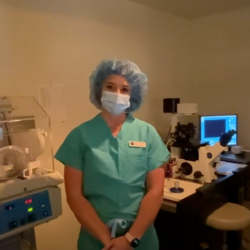
When you reach the In Vitro Fertilization (IVF) stage of fertility treatments, you will want to do everything you can to boost your success. Because the success rate for IVF depends on a number of factors, the more you learn, the more you will be able to separate fact from fiction. Dispelling these 5 myths will help you remain focused on starting your family:
Myth # 1 You have no control in the process.
The success of IVF treatment can be affected by some factors under your control: the types of foods in your diet, the amount of body fat you have in relation to your height (BMI) and what kinds of chemicals you expose yourself to before and during your cycle. It is your job to ensure that your body is in the best possible shape to achieve a healthy pregnancy and your partner’s job to make sure his sperm is as healthy as possible. Although there are no guarantees that your efforts will achieve a successful pregnancy, it is worthwhile to do everything you can to aid the process.
Myth # 2 You must stay in bed after the embryo transfer.
Extreme bed rest and inactivity after the embryo transfer is not necessary. Several studies have shown that pregnancy rates are not affected by resuming normal activity shortly after the embryo transfer. For many, being able to return to a normal schedule and lifestyle will help lower the anxiety of the process. Recommendations on the return to exercise and strenuous physical activity should be tailored to each woman’s particular situation. So most of the time, you can expect that your life will go on as normal after the embryo transfer, and before the big day (pregnancy test)!
Myth # 3 Special diets will boost your chance of getting pregnant
There is no evidence that any specific diet will increase your chances of success. What is recommended is that you eat a balanced diet full of whole grains, lean protein, and fruits and vegetables in order to maximize your health and the health of the baby. Prenatal vitamins play a key role in preparing your body for pregnancy. Occasionally, you may be instructed to take supplemental folic acid or vitamin D. As a general rule, you should try to maintain as healthy a diet and lifestyle as possible, not just to become pregnant, but also to have the healthiest pregnancy possible.
Myth #4 IVF is a waste of time if you are over 40.
From age 30 to 40, the rates for a successful pregnancy do begin to drop. However, even though women over 40 have an IVF success rate of less than 22 percent at most fertility clinics, there have been many healthy pregnancies achieved in this age group. Each woman’s pregnancy journey is unique and successful pregnancies are not solely dependent on age.
Myth #5 If IVF doesn’t work there is something you could have done better.
This myth is the most important one to dispel. In any given cycle, the chance of success varies depending on your age and individual health circumstances. The way that current IVF treatment is performed, unsuccessful treatments are usually NOT the fault of the patient. There should be little fear that you could make a mistake and “mess up” the fertility treatment.
There continue to be many misunderstandings and misconceptions about the condition of infertility and fertility treatments. Your physician and fertility staff are the best resources available to help separate fact from fiction. Asking questions helps you to understand your situation, and empowers you to become an active participant in your path to having a positive outcome.



